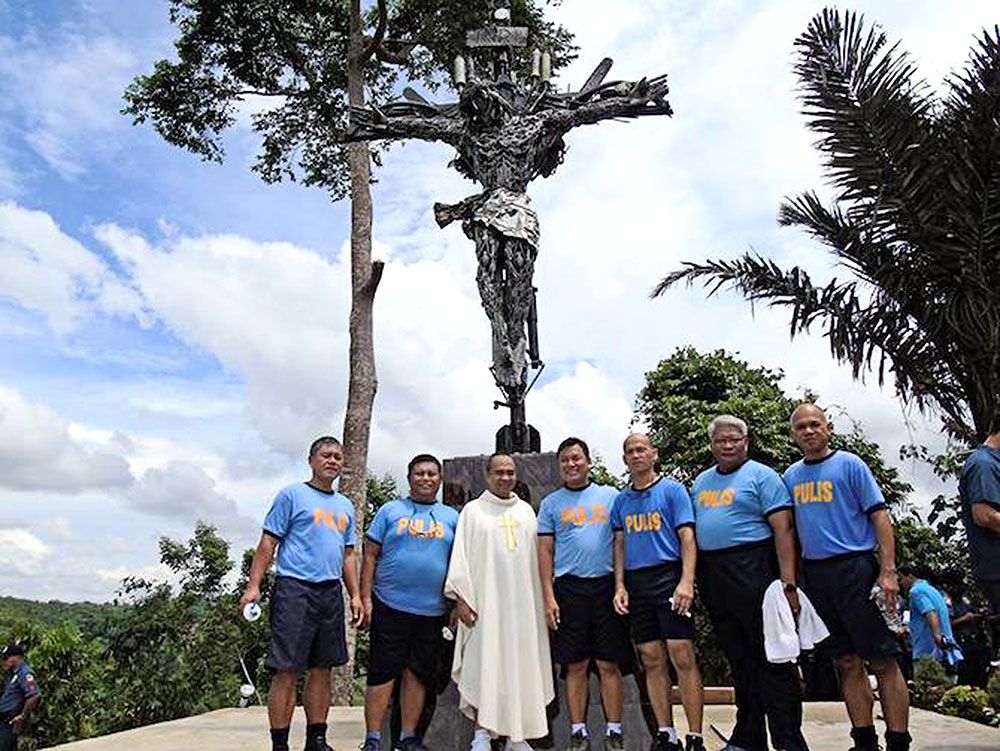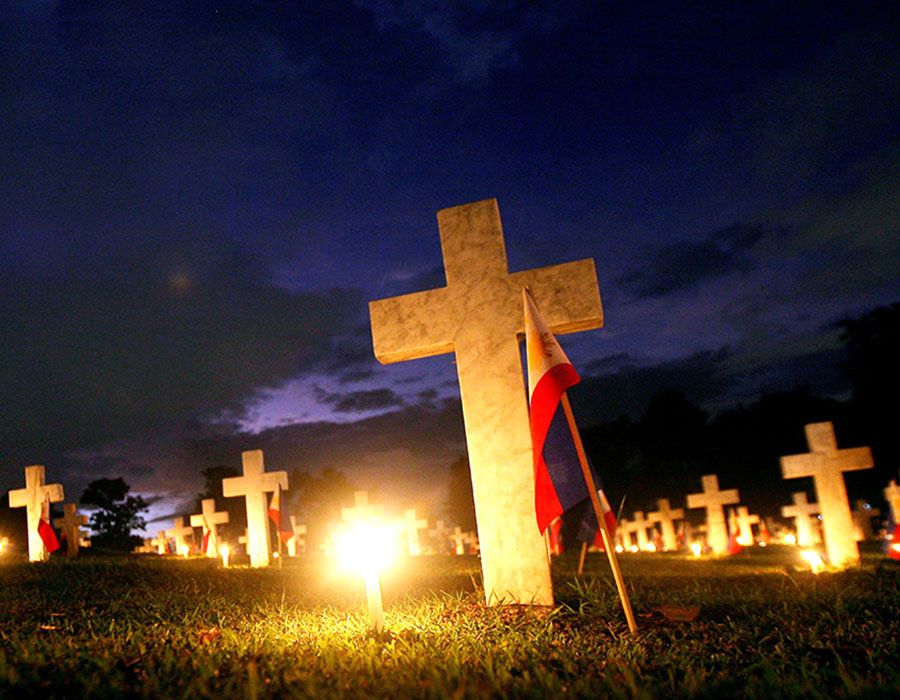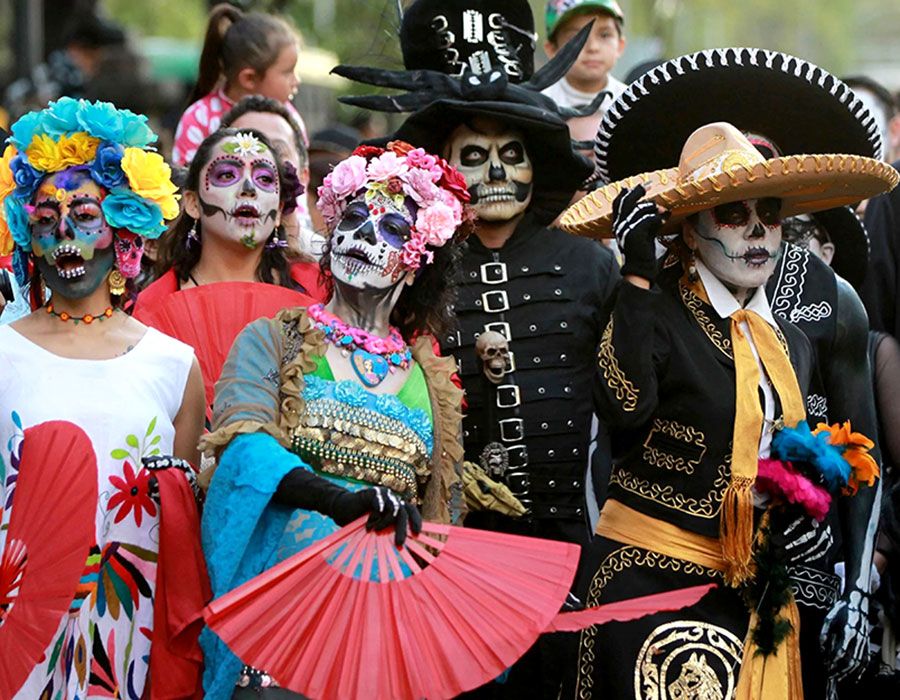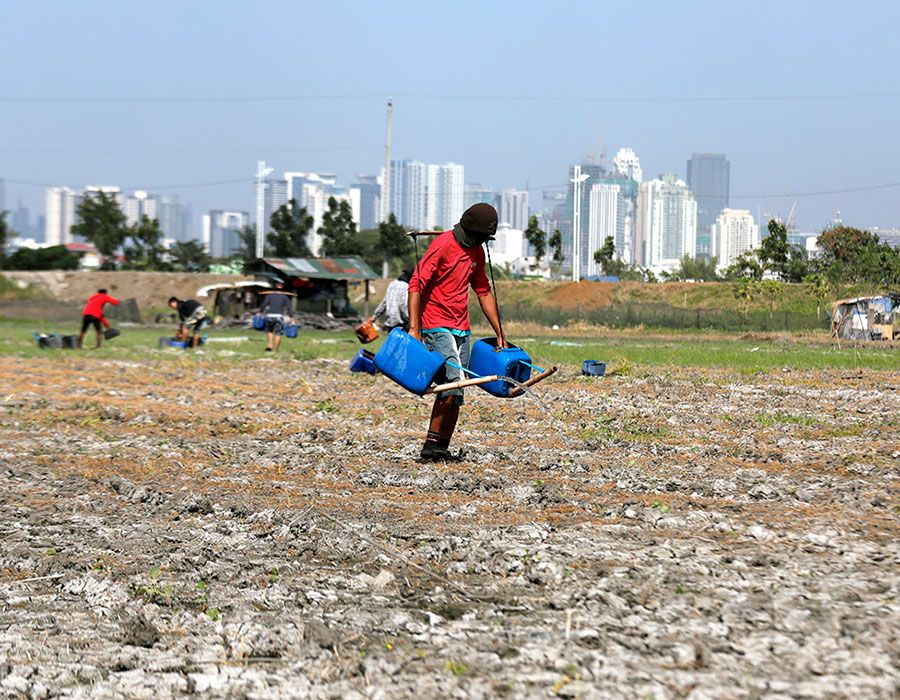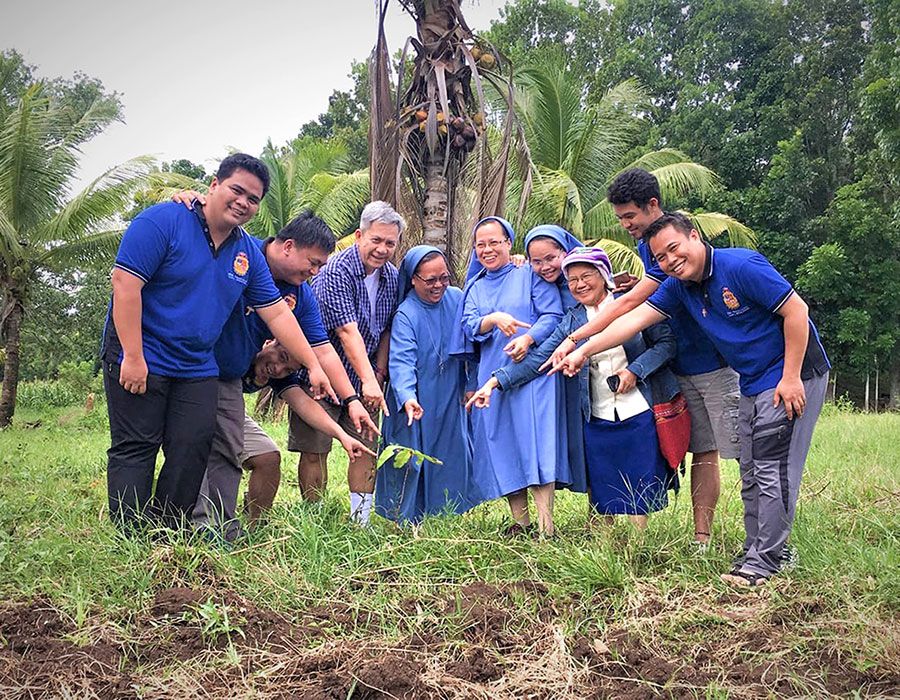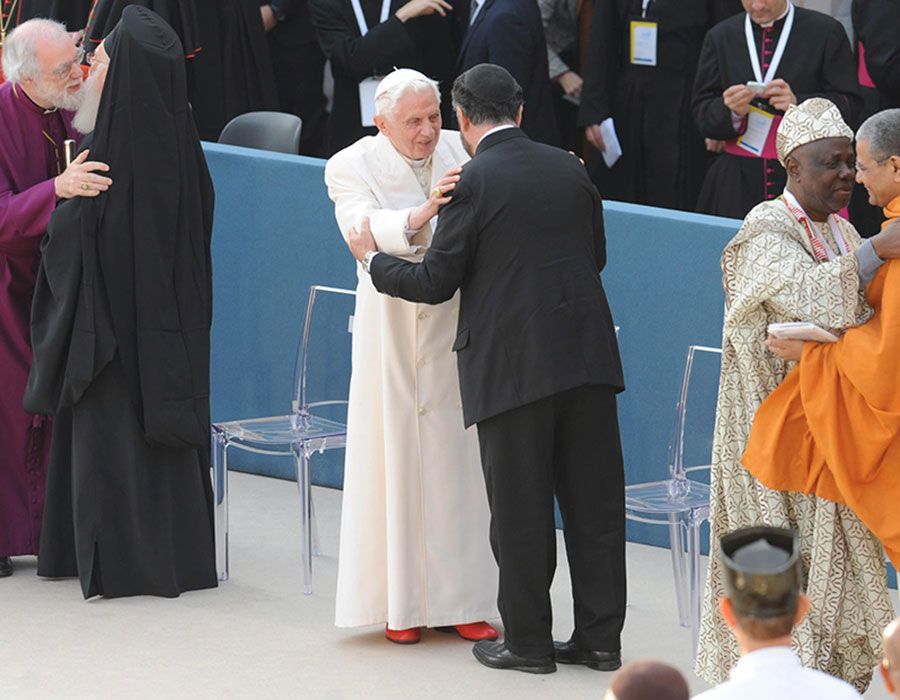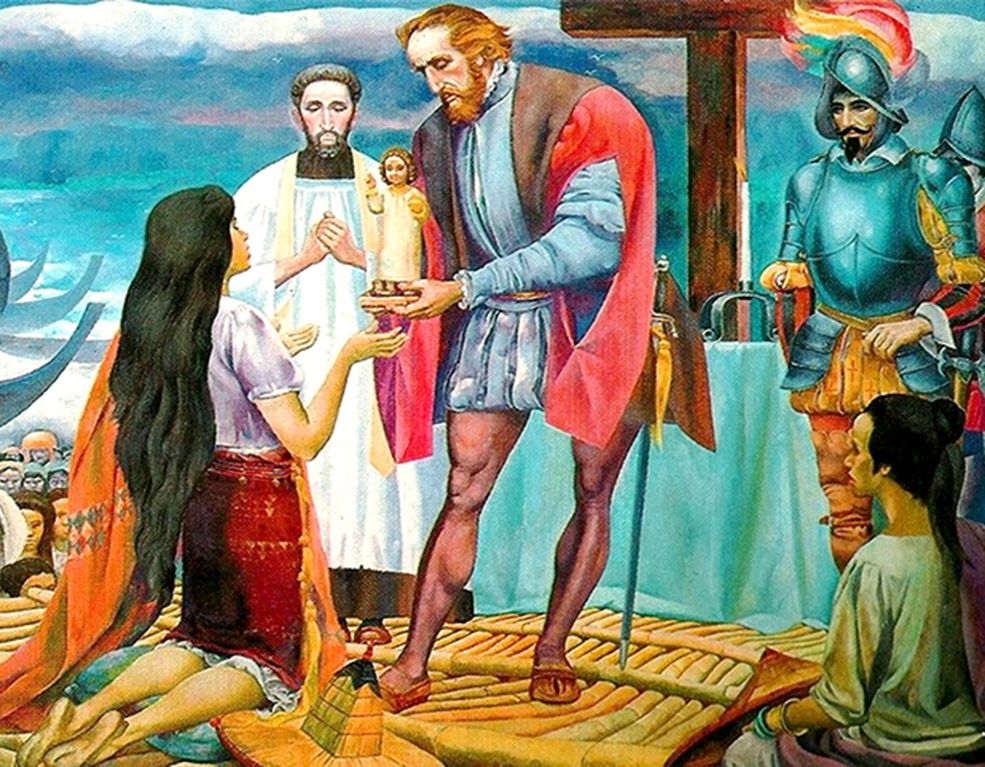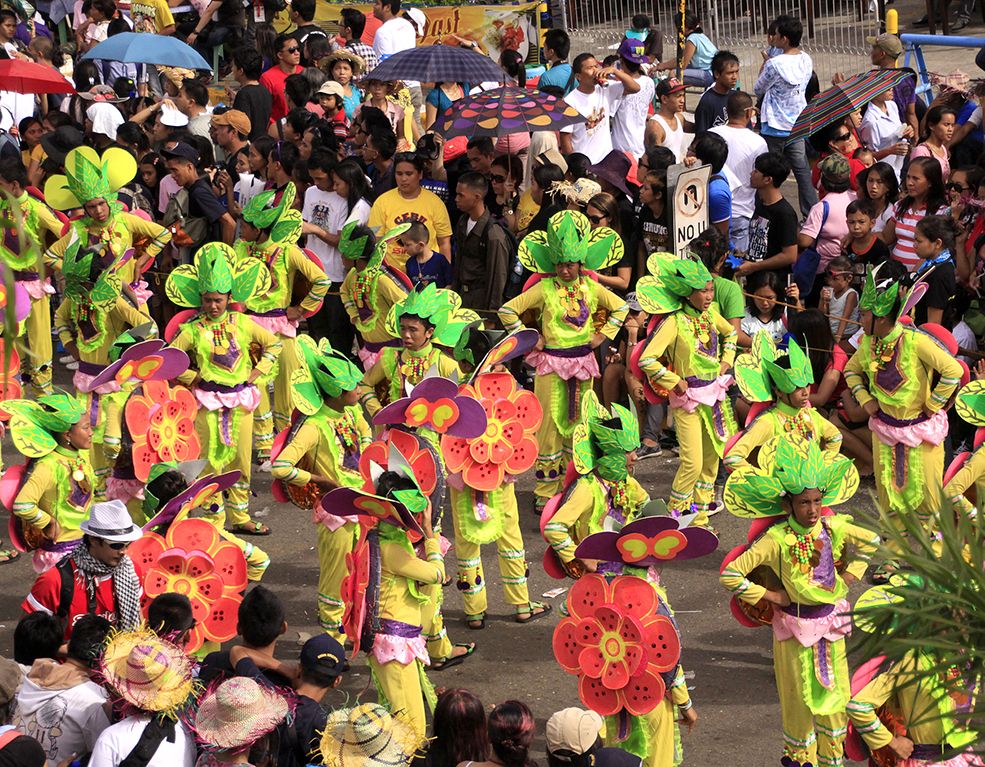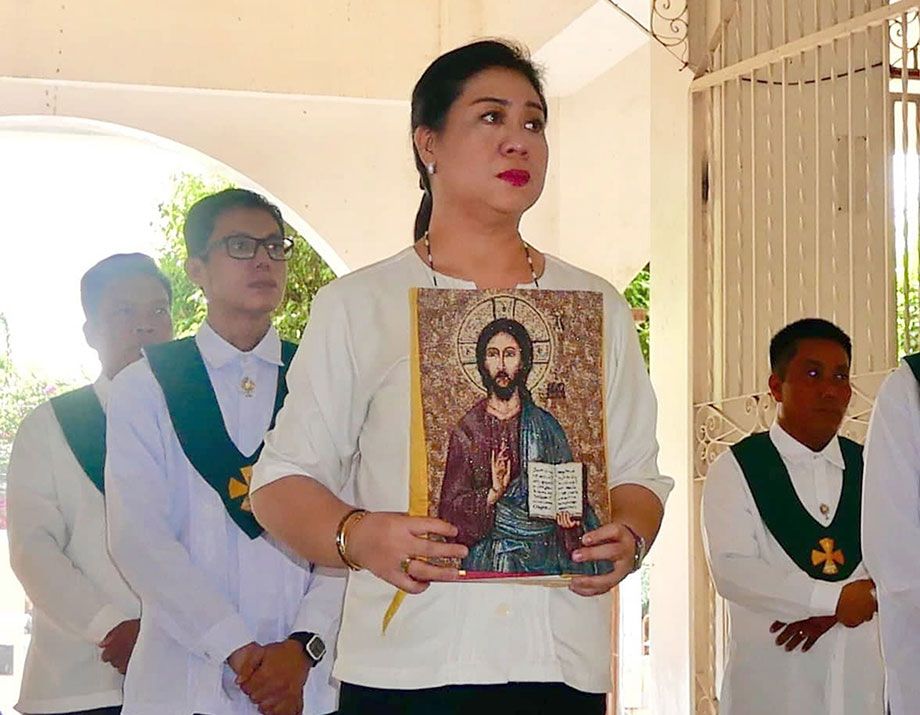The condemned Nazarene wears a crown of barbed wire. His body sinewed with pistols, assault rifles and hand grenades. His loincloth a crumpled piece of sheet metal. Nails made of 60mm mortar rounds and rifle grenades impale His hands on a cross jerry-rigged out of steel I-beams, firearm magazines, car mufflers, axes, sawmill blades, chains, engine parts, dynamite sticks, fishing nets, a bolo, water tank, and clock.
‘Environmental Jesus’ is a grotesquely beautiful and subtly disturbing work of art. It was created from deactivated firearms and munitions confiscated in police operations as well as debris from the destruction caused by natural disasters that ravaged the Eastern Visayas region in recent years.
Unveiled on June 4, 2018 in observance of World Environment Day, the scrap metal art sculpture represents the PNP’s advocacy to promote awareness on the urgent need to preserve the environment, according to PNP Region VIII Director Chief Superintendent Gilberto Cruz who conceptualized its design.
‘Environmental Jesus’ is the work of Lucky Salayog, a 31-year-old metal sculpture artist from Aurora, Isabela. “I believe that art can influence people to do good and change for the better,” he explained when I reached out to him through Facebook Messenger. “Hopefully, the sculpture can inspire us to stop doing violence to the environment and other Filipinos.”
Jesus, The Builder
Being a craftsman Himself, I think that Jesus would agree with the Filipino artist in his belief that art can spark social change. From the Gospels of Mark and Matthew, we know that Jesus worked as a carpenter before beginning His three-year public ministry in Judea more than 2,000 years ago.
In his white paper entitled “An Examination of Jesus’ Inclusion of Work Roles in His Parables”, Dr. Klaus Issler points out that the Greek word used in the Synoptic Gospels to describe Jesus’ occupation is tekton (pronounced “teck-tone”), which has been translated in English as “carpenter.”
Issler, Professor of Christian Education and Theology at Talbot School of Theology in La Mirada, California, cites colleague Dr. Ken M. Campbell who suggested “builder” as the better translation. Campbell, Associate Professor (ret.) of Biblical Studies at Belhaven College in Mississippi, writes, “In the context of first-century Israel, the tekton was a general craftsman who worked with stone, wood, and sometimes metal in large and small building projects.”
Joseph taught his craft to Jesus who helped His earthly father meet the family’s daily living expenses. In those days there were probably very few artisan work opportunities in Nazareth, a mountainous hamlet in the backwater region of Galilee, with a population of about 400, most of whom eked out a living by farming small patches of land.
Dr. Richard Batey believes that most of the laborers from Nazareth probably worked on building projects in the adjacent city of Sepphoris, which is about an hour’s walk from Nazareth. Batey, Professor Emeritus of Religion at Rhodes College in Memphis, Tennessee, was Assistant Director of the University of South Florida’s archaeological excavations at Sepphoris from 1984 to 1989.
Construction jobs were aplenty in Sepphoris in 4 BC when Herod Antipas rebuilt the city as the capital of his kingdom of Galilee and Perea (he would eventually move his kingdom’s capital to Tiberius 20 years later). According to Batey, major building projects in Sepphoris at that time included Herod’s principal residence, an administrative center, and a 4,000-seat amphitheater with a 156-foot wide and 27-foot long stage.
Batey thinks that Joseph and Jesus may have worked on the amphitheater, and Jesus’ use of the term “hypocrite” may have been influenced by His exposure to dramatic presentations in Sepphoris. “Hypocrite” comes from the Greek hypokrités, which means a stage actor, who during ancient times often wore masks; hence, one who pretends to be what he is not. Jesus used “hypocrite” more than anyone else in the Bible, often to rebuke the self-righteous and pretentious Pharisees.
The Wrath Of Jesus
The PNP Region VIII’s laudable advocacy to promote environmental awareness through a sculpture of Jesus made out of tools of violence reminded me of the only documented instance when the Prince of Peace became violent.
Every year, Jews all over the world celebrate Passover to commemorate their liberation by God from slavery in ancient Egypt and their freedom as a nation under the leadership of Moses. During the time of Jesus, thousands of Jews from all over Israel flocked to Herod’s Temple in Jerusalem as Passover drew near. The temple was divided into several sections, one of which was the Court of the Gentiles where moneychangers and vendors selling cattle, sheep and doves set up shop.
Sanctioned by Jewish authorities (some bible scholars suspect for monetary reasons), these commercial activities within the temple grounds allowed Jews to exchange local currency with temple coins so they could buy animals for the Passover sacrifice. Passover being a major Jewish feast, the atmosphere in the temple courts on that day must have been noisy and frenzied, like that of a teeming tiangge (flea market).
When Jesus saw this perverse spectacle, He went berserk. According to the Gospels of John and Matthew which provide a brief but evocative account of the Messiah’s righteous rampage, Jesus “made a whip out of cords”, probably by cobbling together pieces of rope used to secure the livestock for sale.
Then He “drove” all animals and their vendors out of the temple courts, the Gospel writers perhaps opting for a less severe and multi-purpose verb to suggest simultaneous actions such as loud verbal threats, a menacing glare, and robust, liberal use of the whip. The 33-year-old Galilean in the prime of his manly strength also scattered the coins of the moneychangers, overturned the benches of those selling doves, and shouted, “Get these out of here! Stop turning my Father’s house into a market!”
Truth Speaks To Power
I think that Jesus, if He lived among us today, would embrace the role of environmentalist. He would urge us to preserve all of His Father’s creations, including the environment upon which our very survival depends. Outspoken and blunt when calling out human frailties and societal ills, He would rail against the selfishness, apathy and greed that are the root causes of our natural environment’s progressive destruction. And, I suspect, He would not limit His advocacy to the environment
Jesus took on the powers that be on behalf of the poor, dispossessed, marginalized and outcasts in Israel who were struggling under the corruption of Jewish authorities and the authoritarian yoke of Roman occupation. He had come to establish the Kingdom of God on earth; that is, to save all mankind by bringing true change in people through repentance and spiritual conversion (metanoia).
But blinded by pride, greed and ambition, the High Priest Caiaphas and the Roman governor Pontius Pilate mistook Jesus as a threat to their religious and political authority. To Pilate’s question during His trial for trumped-up charges of sedition, Jesus replied, “My Kingdom is not an earthly kingdom. If it were, my followers would fight to keep me from being handed over to the Jewish leaders. But my Kingdom is not of this world.” Like many brave men and women throughout history who dared to speak truth to power and fought for what is right, Jesus eventually made the ultimate sacrifice.
Jesus In Our Midst
I believe that Jesus lives among us today in people who choose goodness and put others before self. Parents who lead by example and teach their children the values of honesty, courtesy and respect, gratitude, generosity, forgiveness and compassion, perseverance, humility, responsibility, and love. Employers and entrepreneurs who conduct business in a socially responsible manner, going beyond the fiscal bottom line and doing their utmost to achieve social justice. Government and private sector employees, laborers and other workers, and military and police personnel who work honestly and with integrity despite their modest salary and the rising cost of living. The voices of dissent who refuse to be silenced and cowed despite the dangers of confronting the authorities who, like Caiaphas and Pilate, are bent on subjugating truth, justice, and democracy to satiate their lust for power and wealth.
Jesus lives among us today and He will always be by our side as we go through our personal Calvary. In spite of our myriad flaws and weaknesses, I believe that if we sincerely strive to follow Him, Jesus will fulfill His promise. “I am the resurrection and the life. He who believes in Me, even if he dies, will live.”

